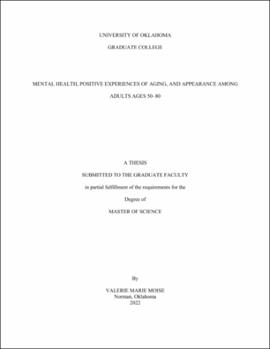| dc.description.abstract | Abstract
Introduction: Poor mental health is a growing issue among U.S. older adults. Experiences and attitudes surrounding appearance may shape how positive older adults’ experiences of aging are, which in turn may affect their emotional health. Questions remain about whether and how much appearance-related issues influence the aging experiences and mental health of older adults.
Methods: This study investigated relationships between three concepts related to appearance (relative appearance self-evaluation, exposure to ageist messages related to appearance, and endorsement of investing effort in looking younger), positive experiences of aging, and mental health among a nationally representative sample of U.S. adults ages 50-80 (N=2,023, 52% female, 71% White). Cross-sectional data derive from the December 2019 National Poll on Healthy Aging, which included a special module exploring experiences of aging, ageism, and health.
Results: More positive experiences of aging were associated with lower odds of depressive symptoms (OR=.731, p<.001) and poor/fair self-rated mental health (OR=.695, p<.001). Comparisons of these relationships by gender indicated that the odds of depressive symptoms were significantly lower among men than it was for women with comparable positive experiences of aging scores (p=.024); no other gender or age group differences were documented. All appearance-related concepts examined were significantly associated with positive experiences of aging. Those who evaluated themselves as looking younger than others their age and those who endorsed investing effort to look younger reported more positive experiences of aging (b=.941 and .505, respectively, both p-values <.001). Adults who reported more frequent exposure to ageist messages reported less positive experiences of aging (b= -147, p=.028). There were no gender or age group differences in these relationships. Bivariate Pearson correlations found that those who evaluated themselves as looking younger tended to endorse investing effort to look younger(r=.205, p <.001). Those who endorsed investing more time in looking younger also reported more frequent exposure to ageist media related to appearance (r=.124, p < .001).
Conclusion: This study adds to the literature on the roles of appearance and positive experiences of aging in shaping older adult mental health outcomes. Appearance has significance for older adults and may indirectly affect mental health via its influence on positive experiences of aging. Multilevel interventions, that aim to improve mental health outcomes among older adults, would benefit from addressing appearance related issues and positive experiences of aging. This will help to guide change in policies, practices, and social norms.
Key words: positive experiences of aging, appearance, mental health, depressive symptoms, older adults, ageism. | en_US |
